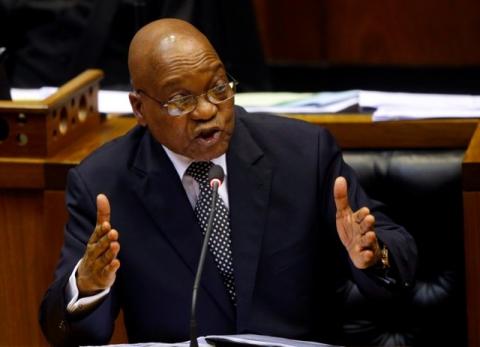Advertisement
South Africa's Zuma quizzed over rich friends' links to power
JOHANNESBURG (Reuters) - South African President Jacob Zuma faced questions on Thursday over allegations his wealthy business friends influenced political appointments, in the final investigation by an anti-graft chief who has been a thorn in his side.
Public Protector Thuli Madonsela won popular acclaim when her investigation into $16 million of improper state spending on Zuma's private home was upheld in the constitutional court and the president was forced to repay some of the funds.
As part of her final inquiry, Madonsela will quiz Zuma behind closed doors later on Thursday afternoon over accusations the Gupta family played a role in selecting cabinet members and used their relationship with the president to gain favor in terms of government tenders, payments and licenses.
The Guptas deny any wrongdoing and say they have been victims of a "sustained political attack".
"If the report finds serious wrongdoing by the president, it will be extremely damaging and will embolden his opponents inside and outside the ruling party," said Prince Mashele, analyst at the Centre for Politics and Research.
"Madonsela knows this is her final farewell and I don't expect her to be mild. She'll hit this one hard."
Madonsela will release her findings by Oct. 14, the day before her seven-year term comes to an end. Zuma approved parliament's choice of Busisiwe Mkhwebane as the next public protector earlier on Thursday.
THE GUPTAS
The three Gupta brothers moved to South Africa from India at the end of apartheid in the early 1990s and went on to build a business empire that stretches from technology to the media to mining.
They became household names in South Africa after Deputy Finance Minister Mcebisi Jonas said in March they had offered to secure him his boss's job.
Zuma's son, Duduzane, quit as a director of a firm owned by the Guptas in April because of "aspersions" about his family and after large South African banks cut ties with the Guptas.
Opposition parties have called for Zuma's resignation over his links with the Guptas and top members of the ruling African National Congress (ANC) have condemned what they call "state capture" by private interests, without naming the president.
But analysts say there is little appetite in the ANC to remove a second party president in a row, following the recall of Thabo Mbeki in 2008, given the boost such internal instability would give opponents.
Zuma is expected to stand down as ANC leader late next year at party conference before his second and final term as South African president finishes in 2019.
"The public protector's report could be very damaging for Zuma, but a slow, incremental decline is more likely than an unceremonious exit," said political analyst Daniel Silke.
"The top echelons of the ANC will likely wait for a natural retirement as the forces aligned to Zuma begin to switch loyalties to his successor and the ANC divides widen."
Incoming public protector, Mkhwebane, a lawyer who recently held a position at the State Security Agency, was nominated by 60 percent of lawmakers in a vote last month.
(Additional reporting by Tiisetso Motsoeneng; Editing by Andrew Heavens)



















Add new comment